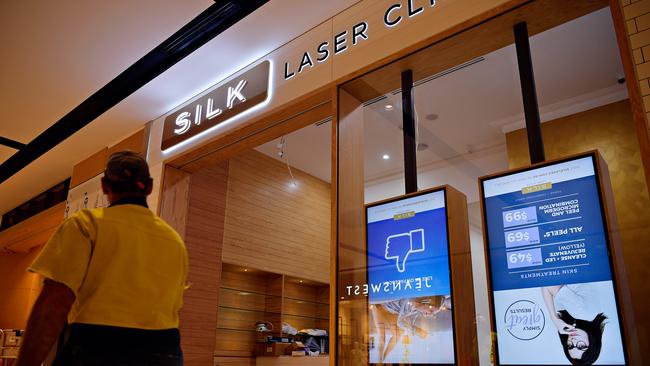
Wesfarmers’ move to buy Silk Laser Australia for $167m demonstrates a broader problem for companies that floated during the global pandemic years of 2020 and 2021 – most are worth less than they were when they started life as a public company.
Particularly hard hit are the groups which have seen their market values sink to the $100m to $400m value range, where they are illiquid and difficult for shareholders to trade in and out of.
Silk Laser fits this description.
Since the company that offers services such as laser hair removal, cosmetic injectables and skincare services listed in 2020, founding boss Martin Perelman has almost doubled earnings.
But its market value has barely moved after it made its public debut as a business worth $162.5m.
One of the large shareholders is Wilson Asset Management with 9.3 per cent, and has vowed to support a Wesfarmers deal. Private equity owner Advent continues to hold 12.5 per cent, Fidelity owns 9.9 per cent, Ice Investors 7.7 per cent and Firetrail 6.45 per cent.
The talk in the market is that there are a number of groups listed with market values between $200m and $800m which would prefer to be privatised, and it is likely to be especially the case for the companies which listed during the deal boom of the global pandemic during 2020 and 2021.
Among the groups which listed during those years – other than Silk – are flowers company Lynch Group, valued at the time at $484m. Its value has more than halved to $201.4m.
Peter Warren Automotive listed as a $483m business and is now worth $457.3m.
One of the worst examples of lost value as a public company is online cosmetics store Adore Beauty, which listed as a business worth $635.3m and is now worth $95m – although much of this is that online websites are far less popular now that consumers are no longer in lockdown.
It is a bit of a similar story with online betting firm BlueBet, which listed with a value of $228.1m when online demand was soaring and it is now worth $56m.
Lenders which listed have also failed to fire on the ASX, including Pepper Money, now worth $570m after listing as a business worth $1.3bn, Liberty Financial, now worth $1.19bn after listing in 2020 worth $1.8bn, Latitude Financial, which is worth $1.35bn after it made its debut worth $3.17bn and Judo Bank pricing in 2021 at $2.3bn and its market value is now at $1.4bn.
Again, there are other reasons contributing to their lacklustre performance – namely, higher interest rates.
Shares in human services provider APM flew out the door when it floated in 2021. It ticked all the boxes from investors focused on environment, social and governance factors and was priced at $3.25bn or $3.55 per share. Its market value is now at $1.78bn, yet weighing on its performance somewhat is its exposure to the National Disability Insurance Scheme.
Australian Clinical Labs has trod water since it listed and is now worth $713m after it was valued at $800m at the time of its float, while fashion retailer Best and Less listed with a $271.2m market value and is now worth $257m.
Four exceptions to the rule for Covid-19 floats are Ventia, now worth $2.23bn after listing as a $1.45bn business, DGL, now worth $439m after floating at $257m, Vulcan Steel, which has a $1.05bn market value after listing at $933m and copper miner 29Metals, worth $584m after listing at $528m.
When it comes to Silk, with the price less than what it listed at and earnings doubled, it makes it look like Wesfarmers snared a bargain.
The offer equates to 10 times its earnings before interest, tax, depreciation and amortisation – a multiple where no doubt the company would likely argue it is fully priced given that it has recommended the offer.




To join the conversation, please log in. Don't have an account? Register
Join the conversation, you are commenting as Logout